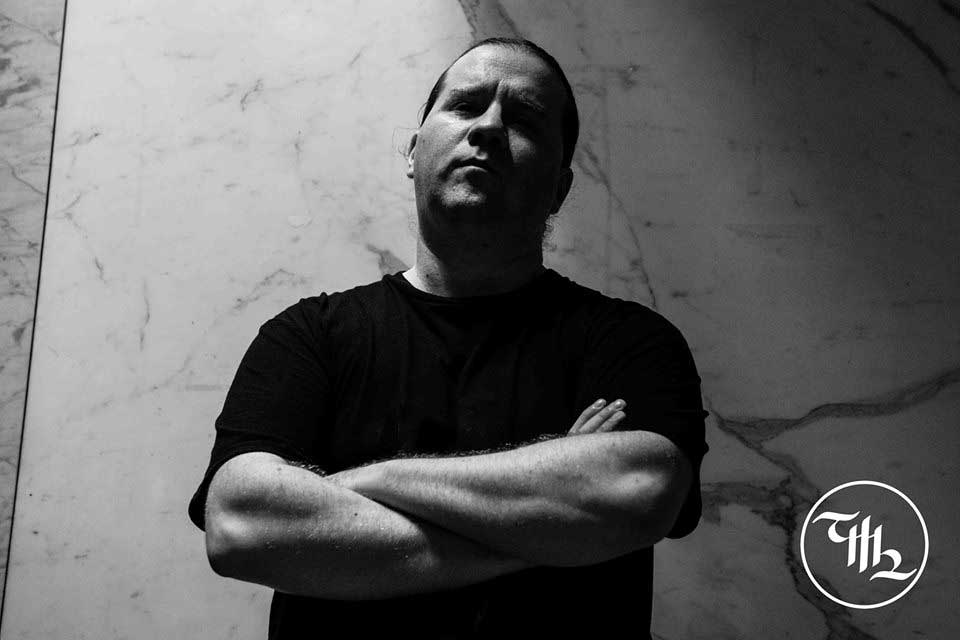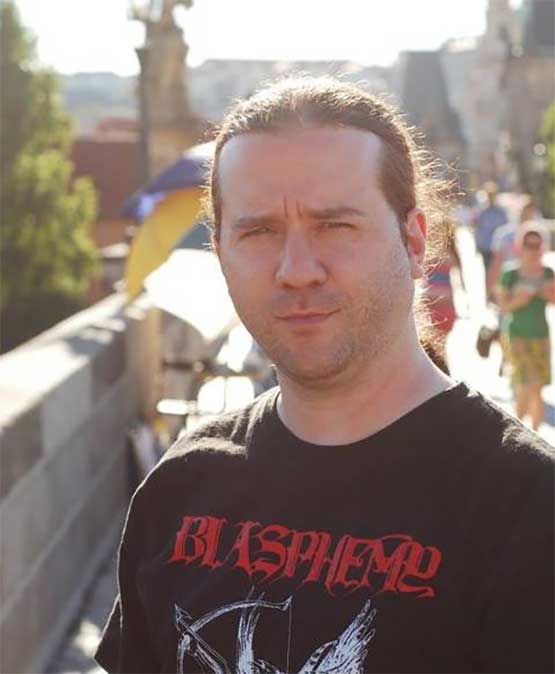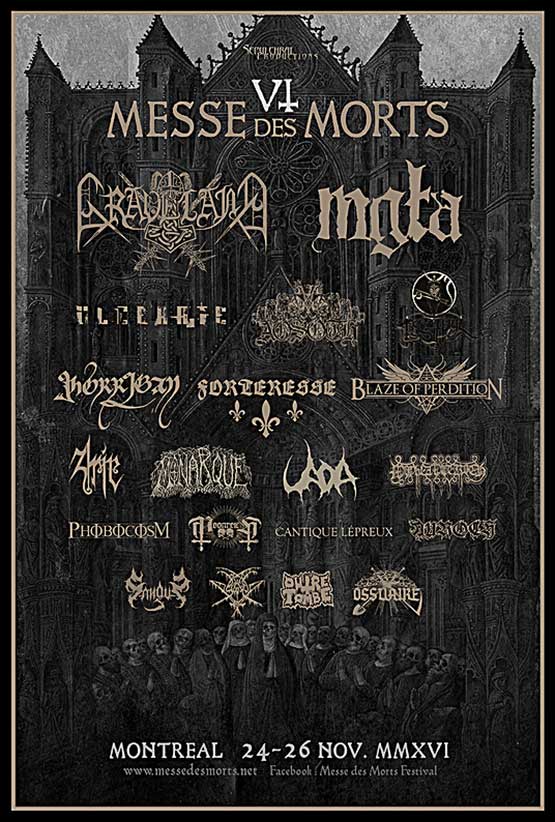Myrkhaal (Sepulchral Productions, Messe des Morts)
2020-05-06
by Niklas Göransson
Myrkhaal is the founder of Montréal-based black metal label Sepulchral Productions; he explains how the inspiration that birthed Messe des Morts, now the biggest North American fest of its kind, was sparked beneath the black sun.
– When we released the FROZEN SHADOWS demo, “Empires de glace” (1996), all promotion and distribution duties fell upon me. I had the best writing skills and grasp of the English language so, naturally, I became in charge of spreading our name. I started dealing with various labels, mail-orders, and so on – eventually ending up running a small distro, selling trade items to a closed circle of friends. At that time, it was a fairly low-level affair and I had absolutely no idea I’d be doing this on a much larger scale for almost twenty-five years and counting!
As FROZEN SHADOWS prepared to enter the studio to record “Dans les bras des immortels”, Myrkhaal had started thinking about turning his clandestine operation into a proper label. Following a death in the family, he’d been left with a small inheritance which would help to get things started.
– The demo sold really well; if I remember correctly, we made two pressings of five hundred each. We knew the debut album would do even better and so decided we’d need a bigger and more official structure to give it a proper push. With that in mind, in early 1999 I created Sepulchral Productions, named after the first FROZEN SHADOWS song, “Adrift in the Sepulchral Snow. I financed both the studio time and printing myself and then released the album under this new moniker. “Dans les bras des immortels” did indeed sell a lot more than the demo, and that’s when I understood the label might one day become something serious after all…

How was your local underground at the time?
– The scene in Québec was, quite simply put, atrocious as far as black metal was concerned. People here caught on really late as opposed to Europe and, in general, their first exposure to ‘black metal’ came through bands like CRADLE OF FILTH and DIMMU BORGIR so, obviously, they had it all wrong from the start. Most of the still relatively few bands which had started popping up were either geared towards this sound or some kind of horrible black and melo-death hybrid. In FROZEN SHADOWS, we were very open about our loathing for such acts – an attitude which didn’t make us all that many friends. These bands had no business playing so-called black metal, so it was important for us to make them feel unwelcome. This is probably a mindset younger readers will have a hard time understanding but, at the time, many felt that black metal had to be ‘preserved’ from unworthy individuals; if it wasn’t your place to be, you got called on it and sometimes not very nicely.
O. T. from AKITSA shared similar sentiments when I spoke to him.
– Obviously, AKITSA was another story, and I’m not surprised to hear O. T. felt the same way. His mind was more in the right place – even though, being entirely honest, we didn’t have a particularly good relationship back then. I mainly put this down to the generational gap; he was still in his teens while I’d already reached my mid-twenties so, on that level, it was hard to connect. But, as the years passed by and the age difference became all the more irrelevant, we eventually developed a closer relationship and a mutual respect. After all, we are probably the two individuals who’ve been part of our local scene for the longest time, so now we can act like grumpy old men and complain about how today’s kids don’t understand it as we did…
Sepulchral Productions went on to release a compilation called “Waging the War” in 2001 – featuring among others ANTAEUS, HORNA, FROZEN SHADOWS, LORD BELIAL, and CELESTIA – but then followed three years of silence.
– Besides taking care of the FROZEN SHADOWS distribution, I had to let the label go dormant so I could get my university diploma. Between studying, a nearly full-time job, and the band itself, something had to give. So, when we were getting ready to record our second album, I was simply too busy to handle another release via Sepulchral Productions. I’d started a bachelor’s degree and worked thirty hours per week, so I was physically unable to take on an additional workload. Hell, even FROZEN SHADOWS suffered because of it, and we had a pretty angry discussion after one rehearsal where the other guys complained about my lack of involvement in both the band and our new songs. In hindsight, they were probably right.
As soon as Myrkhaal finished university, he picked the label right back up where he’d left off. In 2006, Sepulchral Productions released three albums which were pivotal in establishing the Québecois black metal scene: GRIS’ “Neurasthénie”, SOMBRES FORÊTS’ “Quintessence”, and “Métal noir québecois” by FORTERESSE.
– ‘Métal noir québecois’ is now how many refer to all French-language black metal from Québec, although I feel the term is too widely used compared to what it originally stood for. Since there was finally a solid local scene emerging, it only made sense to use my label to help give it a little push in the right direction; as a result, I ended up releasing almost exclusively Québecois black metal. It wasn’t necessarily something I’d planned from the start, but as both my label and the provincial scene grew side-by-side, it was a natural progression. I’ve never stopped since, and I don’t think I’d even realised that I’ve been doing this for most of my adult life until you pointed it out. Time does indeed, as they say, fly…

When Sepulchral Productions had gained some momentum and their contracted bands started drawing more interest, Myrkhaal began thinking about sending some of them over to Europe. Thus, in 2011, when opportunity presented itself to bring MONARQUE over for a few club shows and a slot at Under the Black Sun Festival, they jumped at it.
–We discussed the upcoming tour and, in a move which would probably be unthinkable for bigger band-label relationships, they asked me if I wanted to act as tour manager and merchandiser. I said yes and brought the other releases from the label along with me on the road. Since then, I’ve done the same for all the other acts from Sepulchral Productions that crossed over. Being both the label and pretty much de facto manager of the bands on it would usually be something of a conflict of interest, but I have a close-knit relationship with pretty much all of them. Furthermore, I believe the fact that we’re all pushing forward our French culture and heritage helps to strengthen this bond.
I must say, given Myrkhaal’s seemingly lifelong black metal obsession – as discussed in last week’s feature – it’s a shame he wasn’t able to make it over a decade or so earlier. Things were very different at gigs and festivals back then.
– I don’t doubt this for a second. The truth of the matter is quite simple: during that period, I was too poor to travel abroad. My family decided to move to the countryside when I was eighteen, and at that time I wanted to study and start playing music so there was no way I’d be following them out into the middle of nowhere. So, I stayed behind in Montréal but, since we were definitely not a rich family, I was left completely on my own and had to fend for myself. They simply wouldn’t have been able to pay for me to live in the city. Of course, at that age you usually don’t have a high-income job so I barely had enough to scrape by with the basic food and shelter requirements, which was still totally fine with me as it meant one hundred percent independence and that was the most important thing. Buying records and fanzines pretty much made sure I had nothing left of the meagre amount remaining once the bare necessities were covered, so I definitely wouldn’t have been able to finance a trip to Europe. Even though I would’ve liked to see for myself what the scene looked like on the other side of the ocean, it simply wasn’t to be at that particular time.
What were your first impressions once you finally got here?
– Seeing the black metal scene on the European side was a real eye-opener for me, it’s both bigger and more structured than in North America. I also feel it’s remained closer to the roots of the genre in general, with more serious and dedicated individuals. In terms of spirit, I’d say the scene in Québec is probably the closest to the European one but, in general, the pool of fans and bands on this side of the ocean is not comparable to what I saw during the MONARQUE tour. In particular Under the Black Sun had a profound impact on me, as it was the first time I saw a festival dedicated solely to black metal that was capable of attracting hundreds of die-hard fans. We do get bigger black metal bands over here, but at these shows you look around and a good half of the attendees could just as well have gone to a deathcore show. At UTBS, it was clear that everyone present knew their black metal extensively, and I felt this type of event was clearly lacking back home…
Myrkhaal felt so inspired that he decided to start his own festival – Messe des Morts. Once back home again, he first got in touch with INQUISITION, whom he’d brought to Québec once before, and then ABSU.
– I’d been in contact with the ABSU bassist, Ezezu, for a while since he was buying some of our releases. I also wanted to bring over bands from Europe who’d never played here before – this is something I still try to do, ten years later – so I booked GLORIOR BELLI and ANGANTYR. Finally, I added a few bigger local bands like FORTERESSE, MONARQUE, CSEJTHE, and CHASSE-GALLERIE and the line-up was set. When I announced the first edition, the response was overwhelmingly positive and the 325-capacity venue sold out on both days.
Messe des Morts I was held in November 2011 – the festival has since grown to be the biggest of its kind in North America. Given the budget required by such an undertaking, the first year must’ve been pretty nerve-racking.
– To be honest, I wasn’t all that nervous; I’d decided to start out small and build it up gradually, assuming the first edition was successful. That’s the mistake many fests make when starting out… they want to be too big, too quickly. Nobody knows if your festival will be good, well-organised, and an overall enjoyable experience the first time around, you must build your audience gradually. If you just pile up expensive bands from the get-go – before the word-of-mouth from the first-year attendees start spreading that this is a fest worth attending – chances are you’ll end up paying too much in relation to the number of persons you can realistically draw. I wanted to make sure I’d avoid that mistake.

For Messe des Morts II, the fest had grown to a three-day format – one they’ve kept ever since. The Thursday pre-show is held in a medium-sized venue, whereas the two main days are hosted by a larger establishment.
– Obviously, a venture like this, now gearing towards its tenth edition, is bound to have its ups and downs. Among the better moments are all the bands we could bring over for the first time, either to Canada alone or, many times as well, even a North American debut. We’ve probably had around forty such acts here over the years. And, of course, working with the different bands when you’re all on the same page always brings good moments. Our last edition was a particular highlight on that front; all the groups we invited were a pleasure to work with and had no inflated egos or unwarranted attitudes. Also, logistics ran perfectly – up to this point it was probably the best one, technically speaking. Another highlight would have to be two years back when we had TORMENTOR on the fest and Attila came up to me at the end of it. Starting from the seventh edition we moved the fest to a place that used to be a Catholic church, and he told us, ‘As you can surely guess, I’ve seen tonnes of venues but this has got to be the most awesome one I’ve ever played in!’ When an artist with his kind of history tells you that, you know you’re doing something right.
What about low points?
– The lows have been rarer, fortunately, but they’ve generally had to do with bands, or band members, with shitty attitudes. It doesn’t happen very often but, since we’re all human, we occasionally get musicians with whom it’s harder to work than others. Be it drug-fuelled misconduct in the spur of the moment or more of an attitude problem over the course of the festival; we’ve had a few individuals we didn’t much like working with, but that still didn’t prevent either party from ‘having the show go on’, so to speak. There was one instance where things became particularly hard, and the worst thing is that it wasn’t even our fault. One band coming over had us change accommodations several times, because their travel party ended up bigger than initially planned. So far, nothing out of the ordinary, but they wanted a last set of changes their manager didn’t bother telling us about, thinking we’d ‘figure it out’ by ourselves.
Myrkhaal is not a psychic and did, as such, not ‘figure it out’. Consequently, the band members were mightily annoyed upon arrival, as the Thursday pre-fest had just started.
– They called the person responsible for our logistics to have her ‘solve the problem’. Not in a polite, ‘I think there might’ve been a miscommunication here, can you help?’ way, more of a ‘I’ll scream at the top of my lungs and you’d better fix this, or else…’ manner. So, I grabbed the phone and ended up getting into a heated argument, with the pre-show going on in the background. Then the band leader called me in and arrogantly tried this ‘Do who know who you’re talking to?’ number, and I just went nuts on him. We did fix the problem, of course; the worst thing was that had we only been told about this in advance, there never would’ve been an issue in the first place – the changes they wanted were not unreasonable – but now it put everyone on both sides in a bad mood for the entire weekend. So that was definitely the worst moment we had. Aside from Messe des Morts VI, obviously.

The sixth instalment, in 2016, generated headlines in both local mainstream press and international metal media. The controversy stems from Polish black metal veterans GRAVELAND having been booked to headline one evening, as well as the festival’s subsequent refusal to boot them. After a month-long media campaign to stop the fest, the evening GRAVELAND were scheduled to perform saw bomb threats called on the venue as well as a crowd of protestors gathering outside, blocking the entrance and throwing smoke grenades. Messe des Morts were forced to cancel due to security concerns.
– We issued a statement once it was clear to us that we’d have no choice but to cancel the evening GRAVELAND were supposed to play, so I’d say that side is pretty well-documented already. What I found the most appalling about this was how the so-called antifascists were not even interested in the truth, since they only spent their time bending it, ignoring it, or avoiding at all cost to find it out for themselves. The intellectual dishonesty in their ‘press release’ was staggering; they called us a ‘hub for the extreme right’, claimed to have been handing out flyers at some of our earlier concerts because of bands we were having over – which is a complete lie, nobody had ever protested any of our shows before – and said they’d asked us to reconsider hosting GRAVELAND. Another lie, as I did not get a single email about it before that press release. They also said our goals were clear since the festival description stated that our aim was to bring ‘dark and hateful music’ to the area. Sure, that bit is true, but everyone who knows two cents about black metal can understand the context. And the most ironic thing of it all? This ‘hit-piece’ of theirs was illustrated by a photo of me… wearing a BLASPHEMY t-shirt! Out of all the pictures they could’ve chosen to really let people know who this Hitler reincarnated was, they had to use that one.
The ordeal began on October 24, exactly one month before the festival, when a Montréal-based activist group published the aforementioned expose, urging like-minded to take action.
– When that press release landed, the other antifascist groups just lapped it up as the latest gospel from the Lord and were not even interested in digging deeper. ‘Hey, if X blog has published the story, it has to be true, right?’ Actually, one of them – and only one – did try to find out for himself, he came to a venue I was having a smaller show in the week before the festival to ‘have a talk’. In yet another twist of irony, the band headlining the evening had Jewish members so I greeted him by saying, ‘So, you’ve come to talk to the big bad nazi promoter? Hey, by the way, see this guy and that guy doing the soundcheck over there? Nice Jewish kids from the US, perhaps you should warn them about me?’ But I’ll give him that, he was actually there to listen to what I had to say, so much so that he went on the Facebook page the antifascists had put up to bolster their troops in the efforts to cancel the festival and literally said, ‘Hey guys, you know what? I talked to the guy behind this and I really don’t think we’re hitting the right target here…’
How was that received?
– What followed were endless posts by his ‘comrades’ shaming and pummelling him into submission so, like the good sheep he is, he re-joined the ranks and even ended up in the protest. I guess he had to prove to them he was still on the ‘right side’. And for many who participated in this nonsense, it was the same story: they simply didn’t know shit about what they were protesting, and some even felt as if they’d been manipulated. Someone working for the fest is a bit closer to the punk scene and has since met people who took part in the protest. That person had a long talk with a few of them, and most said they regretted doing it. One of them mentioned becoming suspicious when he saw that a lot more ‘people of colour’ were actually attending the fest than protesting it, as this was clearly not the picture of the neo-nazi gathering painted by their ‘leaders’. Later on, as people were making their way back home, some said ‘Okay, I’m not doing this!’ after other antifascists began to literally harass Asians, Latinos, and blacks because they were wearing this or that t-shirt. So, in a way, it was something of a Pyrrhic victory for them because it created lots of discontent within their ranks, with the extreme elements at odds with the more reasonable contingent.
What kind of reactions did you get from the purported attendance?
– The great majority understood that we simply couldn’t go on with the event – even though we never caved under the pressure. And, believe me, when the city mayor gets involved and all the media outlets keep calling because they want a piece of you, that’s a tonne of pressure. So, even though everyone was furious about what happened, they stood firmly behind us. Since we got so close to the show, cancelling it obviously didn’t change a thing, budget-wise, seeing as how all the plane tickets, hotels, band fees, venue, etcetera had been paid for already, so we were unable to refund people for their tickets. We explained the situation to everyone and promised to organise some sort of smaller make-up show a bit later for those who could make it. We expected a tonne of angry replies but pretty much everyone made a show of support. Of all the tickets we sold for the evening, only two individuals asked for a PayPal refund – that in itself speaks volumes. People were writing from all over, saying they didn’t want us to stop because of what happened and vowed to join the following year if we decided to forge ahead. And they sure did; the seventh Messe des Morts, the one we switched to the church, was even more attended than the sold-out sixth edition. It’s definitely a moment I’d have truly preferred not to experience, obviously, but all in all I think it made the festival stronger.



